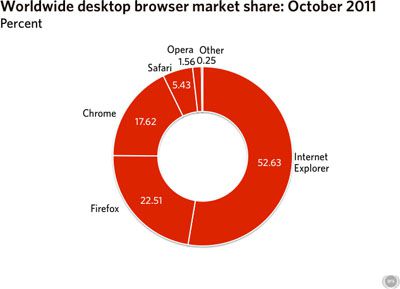- Qualcomm Launches Snapdragon 4 Gen 2 Mobile Platform
- AMD Launches Ryzen PRO 7000 Series Mobile & Desktop Platform
- Intel Launches Sleek Single-Slot Arc Pro A60 Workstation Graphics Card
- NVIDIA Announces Latest Ada Lovelace Additions: GeForce RTX 4060 Ti & RTX 4060
- Maxon Redshift With AMD Radeon GPU Rendering Support Now Available
Internet Explorer Usage Falls Below 50% for First Time in Decade
For most of the Internet’s life, Microsoft has dominated the Web browser market with Internet Explorer. In 2004, the height of its popularity was reached with a staggering market share of 95%. But with the advent of alternative browsers, or at least the introduction of some more compelling options, the future for IE has been questionable.
Once Mozilla’s Firefox hit the scene, things seemed to change for IE almost right away, and as time went on, and Google eventually released its Chrome browser, it seemed definitive that IE’s market share wouldn’t just decrease, but plummet. Early last year, its market share sat at 62%, but as of last month, that number is now below 50%.

While IE’s share has been going down, both Firefox’s and Chrome’s have been going up – although as of late, Chrome seems to be catching up to Firefox at a rapid pace. Safari sits at a comfortable 8.72% share – which I admit is rather impressive, while both Opera and Android’s browser share about 2%.
IE, as it sits at 49.59%, still dominates the Web browser market, but its decline has been seemingly linear. As the browser hasn’t really drastically changed anything in some time (aside from being more complicated, in my opinion), it’s unlikely to stall or begin to increase in share again. As time passes, alternative browsers become even better-known to the regular computer user, and that doesn’t work to Microsoft’s favor.
Hit up the Ars article to look at some other stats, such as mobile browser market shares.




